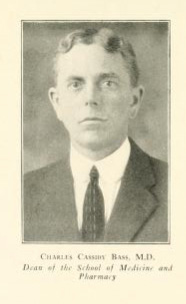Charles C. Bass
Charles C. Bass (1875–1975) was an American physician and researcher who made significant contributions to the field of public health, particularly in the areas of tropical medicine and parasitology. He is best known for his work on the prevention of malaria, a disease caused by parasites transmitted to humans through the bites of infected mosquitoes. Bass's research focused on improving the understanding of the life cycle of malaria parasites and developing strategies for controlling mosquito populations to reduce the spread of the disease.
Early Life and Education[edit | edit source]
Charles C. Bass was born in 1875 in Mississippi, where he later attended the University of Mississippi for his undergraduate education. He pursued his medical degree at Tulane University in New Orleans, where he developed an interest in tropical diseases prevalent in the southern United States at the time.
Career and Research[edit | edit source]
After completing his medical degree, Bass devoted his career to research and teaching. He returned to Tulane University, where he served as a professor and later as the dean of the School of Medicine. During his tenure, he established himself as a leading expert in tropical medicine and parasitology.
Bass's most notable work was in the field of malaria research. He advocated for the use of thin blood smears to detect malaria parasites, a method that improved the accuracy of diagnosis significantly. This technique allowed for the early detection and treatment of malaria, greatly reducing the mortality rate associated with the disease.
In addition to his research on malaria, Bass was also involved in studies on the dental health. He promoted the importance of dental hygiene and developed a special toothbrushing technique, known as the "Bass method," which is still recommended by dentists today for its effectiveness in preventing gum disease and tooth decay.
Legacy[edit | edit source]
Charles C. Bass's contributions to public health and tropical medicine have had a lasting impact. His work on malaria prevention helped pave the way for modern strategies used in the fight against this and other vector-borne diseases. The "Bass method" of toothbrushing remains a testament to his dedication to improving health outcomes beyond his primary field of research.
Bass's dedication to medical research and education was recognized with numerous awards and honors throughout his career. His legacy continues to influence the fields of parasitology and public health, inspiring new generations of researchers and healthcare professionals.
Selected Works[edit | edit source]
- Research on the prevention and treatment of malaria
- Studies on dental hygiene and the development of the "Bass method" of toothbrushing
See Also[edit | edit source]
Navigation: Wellness - Encyclopedia - Health topics - Disease Index - Drugs - World Directory - Gray's Anatomy - Keto diet - Recipes
Search WikiMD
Ad.Tired of being Overweight? Try W8MD's physician weight loss program.
Semaglutide (Ozempic / Wegovy and Tirzepatide (Mounjaro / Zepbound) available.
Advertise on WikiMD
WikiMD is not a substitute for professional medical advice. See full disclaimer.
Credits:Most images are courtesy of Wikimedia commons, and templates Wikipedia, licensed under CC BY SA or similar.Contributors: Prab R. Tumpati, MD

